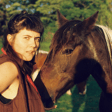
Cabin in the Woods with Imogen Ive
I share a recipe for de-zombifying your life before chatting with Imogen Ive, Director at Mittagundi – a remote 520 acre farm and off grid education centre built by and for young folks in the high country. This convo is a reminder that sometimes hard is good, together is better and a pack horse, tent and sense of adventure beats air conditioned comfort any day.
In the conversational cauldron:
🍯 Setting up a working farm and outdoor ed centre in the middle of nowhere
🍯 Living without modern comforts, electric tools, phones or watches
🍯 Wilderness adventures for young folks from all walks of life
🍯 An oh-snap safety vs. risk reframe
🍯 The dilution of outdoor ed in schools
🍯 How to facilitate confidence and capacity in young people
🍯 Why we don’t try new things, and how to hack our fear of failure
🍯 Bringing off grid flavours to the urban palate
LINKY POOS
Mittagundi Outdoor Education Centre
🧡 Support Reskillience on Patreon 🧡
✏️ Leave Reskillience a written review like a big old legend ✏️



















